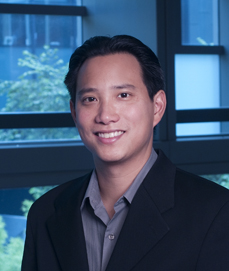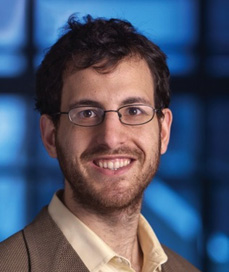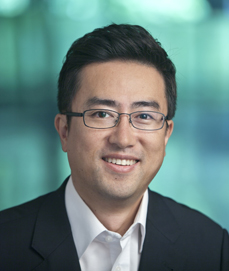by Sophie Burkholder
We would like to congratulate Penn Bioengineering faculty members Brian Chow, Ph.D., Dongeun (Dan) Huh, Ph.D., and David Issadore, Ph.D., on all of their recent promotions to tenured positions as Associate Professors. Both Chow and Issadore taught the second half of the foundational course in the Penn Bioengineering undergraduate curriculum, Bioengineering Modeling, Analysis, and Design Laboratory, in which students form lab groups to complete modules in microfluidics, synthetic biology, bioelectrical signal analysis, and bioanalytical spectroscopy.

Outside of the classroom, Chow’s research focuses on the creation of dynamic input and output interfaces for cells through the use of optogenetics, synthetic biology, genomics, and device engineering. The Chow lab’s current projects include the exploration of functional diversity of photoreception, engineering optically active genetically encoded tools, and their applications in neuroscience and mammalian synthetic biology. His research is supported by the NIH and he is the recipient of a 2017 NSF CAREER Award. Chow also supports undergraduate innovations in research by hosting the annual Penn team for the International Genetically Engineered Machine (iGEM) competition, a program which he helped to create during his time as a graduate student at MIT. One group of Bioengineering students under Chow’s mentorship used the iGEM project as a springboard to create an accessible, open-source plate reader.

The Issadore lab at Penn focuses on the use of microelectronics and microfluidics for medical diagnostics. In projects that combine elements of bioengineering, electrical engineering, chemical engineering, and applied physics, Issadore and his team use an interdisciplinary approach to create miniaturized low-cost platforms for disease diagnosis. His company Chip Diagnostics received the JPOD @ Philadelphia QuickFire Challenge Award last month. Earlier this year, Issadore taught the Penn Engineering course Appropriate Point of Care Diagnostics (APOC), which culminated in a service trip to Ghana (read blog posts written by participating students here). This fall, he will take over the core Bioengineering undergraduate course in Bioengineering Signals and Systems, which focuses on applications in ECG signaling, cochlear implants, and biomedical imaging.

Dr. Huh is the principal investigator of the BIOLines Lab at Penn, which is best known for its work on bioinspired engineering systems that Huh calls “organs-on-a-chip.” Using design and engineering principles based on microfluidics and biomimicry, the Huh lab creates microengineered systems that can reconstitute the structural and functional complexity of healthy and diseased human physiological systems in ways not possible using traditional cell culture techniques. His research has been featured in TEDx, and he has won several prestigious honors and awards including the Bernard Langer Distinguished Lectureship, Lush Prize, the McPherson Distinguished Lectureship, CRI Technology Impact Award, John J. Ryan Medal, Design of the Year Award and Best Product of the Year Award from London Design Museum, NIH Director’s New Innovator Award, and Analytical Chemistry Young Innovator Award. This fall, Huh will teach a graduate level course in biomicrofluidics that will cover the use of microfluidics for biomedical application.
